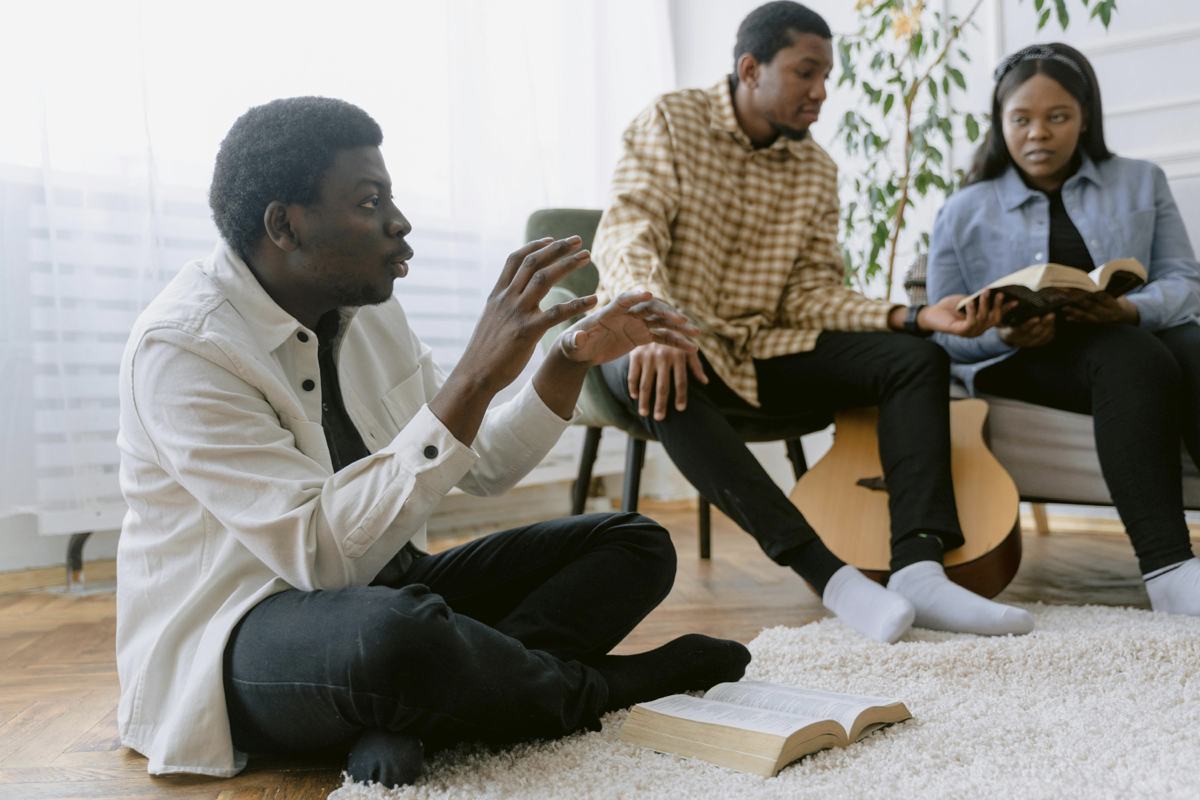Things to Unlearn to Help Your Group Learn Better
by Participatory Approach Support Team, LEAD Global
When we study the Bible together as a community, there are many roles that help us learn and grow in faith. Bible teachers focus on generating and sharing precious knowledge about God and His Word, while facilitators focus on encouraging dialogue and fostering community among learners. In practice, how might facilitating differ from teaching? As you take on the role of a Bible study facilitator, here are some ideas that might challenge the way you think about what helps people learn well.

- Speak less, listen more: Go beyond this frequently repeated cliché, and learn to talk in a way that limits your own over-talking and encourages others to speak up, in order to leave room for participants to be active learners.
- “Know” less, be more ignorant: Ask “ignorant” questions (ask about things you don’t know) as opposed to “fishing” questions (asking what you already have an answer to), which could set you up as the “expert,” “test giver,” or “the person with the correct answers.” Pastors and teachers especially need to actively avoid being stuck in such a role or creating a scenario where they are “looked up to” as the answer-person. Be less prepared to give answers or certainty, and more prepared to say “I don’t know,” making space for open discussions, and asking “what do you think?”
- Present less, adapt more: Too much preparation, especially regarding content and messaging, can stifle open discussions; if you prepare, prepare to support others in their open thinking and learning process by being more flexible and adaptive.
- Less correction, more mistakes: Learn ways to keep yourself from judging or correcting others, because it sets you up as the expert or authority. Also, allowing yourself to make honest mistakes and to stay vulnerable actually goes a long way towards creating a safe environment for others to share, try, think out loud, and learn from experience, as well as to be gracious to one another in their mistakes, too. It also helps to dispel the illusion that the person in charge of Bible studies must be always right; actually, it is healthier when everyone can be constructively challenged to improve, and can grow in their generous sharing of grace.
- Doubt less, trust more: In a church setting, we often discourage open questions and free expressions of opinion because we are afraid people will misinterpret God’s Word and lead others astray. This fear-based approach, however, also discourages learning and sharing. As a facilitator, it is important to believe that:
- the Holy Spirit is at work, and that this is not likely each person’s one-and-only chance to get this topic right; sometimes the Holy Spirit is doing a cumulative, incremental work in our hearts on a subject;
- every person has good reasons and intentions behind even the most problematic opinions or attitudes;
- it may be possible that the person who responds “inappropriately” is doing his or her best at that moment;
- everyone is capable of learning their way to God’s truth;
- the less someone is encouraged to share their opinions and explain their why, the less likely they are going to change their minds. Conversely, open dialogues make space for such change to happen (including our own).
- Less agenda, more space: Proactively do things that make space for open dialogue and meaning-making as a group, such as suspending judgement, drawing out someone’s thoughts behind an idea, and modelling how to agree to disagree. It’s not to say you don’t ever raise questions about somebody’s dubious ideas, but learn to do it in a way that stays constructive and draws out the context and thinking behind that particular idea. While many cultures ascribe high power/authority to questioners and perceive questions as top-down challenges, there are always ways to make it less intimidating and more inviting for the person being asked. For example, if you have an urge to question someone’s idea, try rephrasing your “why” questions in the following ways:
- “I wonder…”
- “I’m curious (how you came up with this idea)…”
- “Thank you for sharing your idea. Could you tell me more about [the idea/the reasoning behind/what it means to you, etc.]…”
- Clash less, collaborate more: When our brain perceives a conflict—even a verbal one—as a threat, it triggers a stress response in us (the well-known “fight or flight” response) and compromises its capacity for reasoning and learning. If you sense a strong urge to confront someone or give a rebuttal, or if you see someone showing such a reaction and need to de-escalate the situation, you can take a deep breath, engage from a place of curiosity, and try reframing your response using one of the following techniques:
- “Yes, and…” thinking: Seek common ground and connect by saying “Yes, I can see that… [point out one part that you can honestly agree with or at least identify with], AND [state your point as an extension, corollary or parallel, not a contradiction]…”
- Lead with “I don’t know, we can keep thinking about that.” Barnabas and Paul argued over Mark. Knowledgeable theologians debate and disagree among themselves; maintain humility and openness to possibly not being able to come to the exact right answer.
- Introduce a new perspective: “It is interesting to hear how you put it. I’m trying to imagine what [someone from a contrasting context or perspective] might think…”
- Acknowledge with humility: “I’m tempted to say [describe your immediate reaction], but [make space for exploring new understandings, e.g., you may have a valid point/there’s something I don’t know, etc.]…”
As Bible study facilitators, our goal is to create an environment where everyone can explore their faith in a way that feels safe, authentic, and relevant to them. The challenge for us, then, is to let go of the need to have all the answers, to encourage openness, and to focus on building relationships in a messy journey of learning that is beyond our control. Hopefully these suggestions can help us become more effective facilitators and help our communities engage more deeply with Scripture together for a life-changing learning experience.
